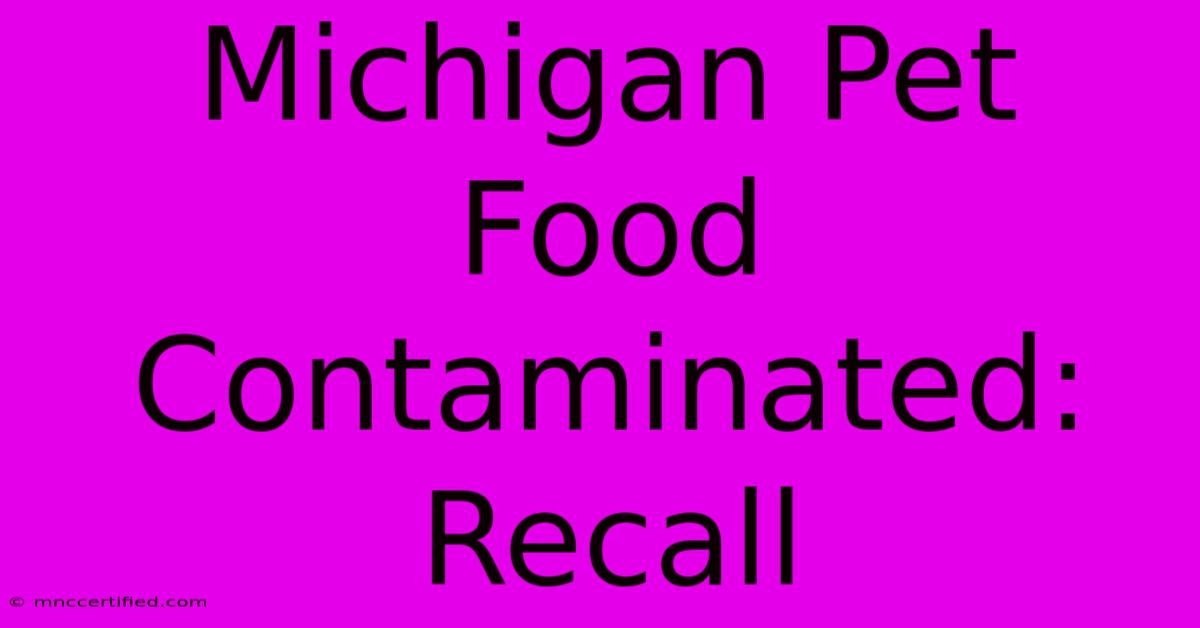Michigan Pet Food Contaminated: Recall

Table of Contents
Michigan Pet Food Contaminated: Urgent Recall Information and Safety Tips
A recent contamination scare involving pet food distributed in Michigan has pet owners on high alert. This article provides crucial information regarding the recall, affected products, and steps to take to ensure your pet's safety.
Understanding the Michigan Pet Food Contamination
The recent recall of pet food in Michigan highlights the importance of carefully monitoring pet food sources and staying informed about product safety announcements. While specifics of the contamination – such as the type of contaminant and the source – will vary depending on the specific recall, this article addresses general concerns and offers advice applicable to any such situation. Always refer to official announcements from the FDA (Food and Drug Administration), the manufacturer, and the relevant state agencies for the most accurate and up-to-date details.
Identifying Affected Products
Determining if your pet food is included in the recall is the first crucial step. Recalls typically involve specific brands, product lines, and batch numbers (often identified by a best-by date or lot code). Look for official recall notices released by the manufacturer or regulatory agencies which will clearly list:
- Brand Name: The specific brand of pet food affected.
- Product Name: The exact name of the recalled product.
- Packaging Details: Size, weight, and any distinguishing features of the packaging.
- Best-By or Lot Codes: Specific codes that identify the affected batches.
Check your pet food packaging immediately! If you find a match, do not feed your pet the affected product.
Symptoms of Pet Food Contamination
The symptoms your pet might exhibit after consuming contaminated food can vary depending on the contaminant. These can range from mild digestive upset to more severe complications. Common signs to watch for include:
- Vomiting: This is a common symptom across many types of food poisoning.
- Diarrhea: Frequent and loose stools are also indicative of illness.
- Lethargy: Your pet might seem unusually tired or sluggish.
- Loss of Appetite: A decreased interest in food can be a sign of something wrong.
- Dehydration: Monitor your pet's water intake. Dehydration is a serious concern.
- Neurological Symptoms: In some cases, more severe neurological symptoms might appear. These might include tremors, seizures, or incoordination.
If your pet displays any of these symptoms after consuming the potentially contaminated food, contact your veterinarian immediately.
What to Do if You Have Contaminated Pet Food
If you’ve identified affected pet food in your possession, follow these steps:
- Stop feeding your pet the recalled food immediately.
- Discard the contaminated product properly. Follow local guidelines for disposing of potentially hazardous waste. Often, this will involve sealing the product tightly in a trash bag and placing it in the regular garbage.
- Contact the manufacturer or retailer. You may be entitled to a refund or replacement.
- Monitor your pet closely for any symptoms of illness.
- Contact your veterinarian if you notice any concerning signs.
Preventing Future Pet Food Contamination Issues
The best way to safeguard your pet is through proactive measures:
- Stay informed: Regularly check the FDA website and other reputable sources for pet food recall announcements. Subscribe to recall alerts if available.
- Buy from reputable sources: Purchase pet food from trusted retailers known for quality control.
- Check expiration dates: Always check the best-by or expiration date before feeding your pet any food.
- Inspect the packaging: Look for any signs of damage or tampering before opening the food.
- Store food properly: Keep pet food in a cool, dry place to prevent spoilage and contamination.
Remember, your pet's health is paramount. Staying informed and proactive is the best way to protect them.
Keywords: Michigan pet food recall, pet food contamination, pet food safety, FDA pet food recall, Michigan pet food contamination recall, recalled pet food, pet food safety tips, pet food poisoning symptoms, pet food recall alert
Note: This article is for informational purposes only and does not constitute veterinary advice. Always consult with a veterinarian for any health concerns related to your pet. Specific details regarding a Michigan pet food recall will be found on official government and manufacturer websites. Always refer to those sources for the most accurate and up-to-date information.

Thank you for visiting our website wich cover about Michigan Pet Food Contaminated: Recall. We hope the information provided has been useful to you. Feel free to contact us if you have any questions or need further assistance. See you next time and dont miss to bookmark.
Featured Posts
-
2024 Holiday Bowl Syracuse Vs Washington State Odds
Dec 28, 2024
-
Recalled Pet Food Bird Flu Cat Dies
Dec 28, 2024
-
51 Year Old Missing After Caribbean Fall
Dec 28, 2024
-
30 Year Old Charged With Quadruple Attempted Murder
Dec 28, 2024
-
Seaside Hike Four Days Walking
Dec 28, 2024